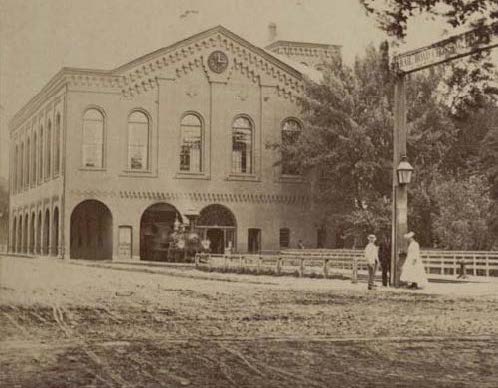Frederick Douglass (1817 – 1895) was one of America’s foremost abolitionists. Douglass was born into slavery in 1818 and escaped into freedom in 1838. He eventually settled in Massachusetts, where he gave many anti-slavery speeches, including in Lowell. He spoke at Huntington Hall, one of the city’s largest speaking halls. These arches replicate the entrance to the Merrimack Depot (a once bustling train station) where Huntington Hall was housed. Most notably, Douglas met with his former enslavers, telling the public “This is not a lesson in forgiveness,” and referred to his former captors as “agents of hell.”
More of the Story
In 1852-53, the City of Lowell and the Boston & Lowell Railroad Corporation jointly funded the construction of the Merrimack Depot, the design for which included the city’s largest public hall, Huntington Hall, and a second large chamber called Jackson Hall, both located on the second floor of the building. Lowell builder Edward F. Watson erected the depot and the halls. Locomotives with passenger cars ran through the depot’s archway, allowing passengers to board or disembark inside the depot. Both halls proved to be exceptionally popular and Huntington Hall featured many notable men and women, including abolitionist Frederick Douglass, women’s rights advocate Ann E. Dickinson, labor reformer Jennie Collins, Greenbacker firebrand Denis Kearney, Lowell native (and for several years a Radical Republican) General Benjamin F. Butler, and many others.
Of the many statewide political conventions held over the years, Huntington Hall was the site of numerous Democratic, Republican, and third party meetings and caucuses. Among the most heated prior to the Civil War were those involving the American party (1855-1857), also called the Know-Nothings, the Douglas Democrats (1860), and the Freemont Republicans (1856). Given the city’s large Irish-Catholic population in the 1850s, the Know-Nothings stirred up considerable controversy by attacking “Papist plots” allegedly seeding disunion between North and South, as well as promoting anti-immigrant legislation as means of combating vice, intemperance, and political corruption.
(Thanks Martha Mayo)


